
Long-Term Neurocognitive Effects Linked to Chemotherapy-Induced Hearing Loss
More children are surviving malignant brain tumors than in the past, thanks to intense treatments using platinum-based chemotherapy. Unfortunately, the therapy has a known side effect of permanent hearing loss, resulting from damage to the inner ear. Investigators at Children’s Hospital Los Angeles have found that chemotherapy-induced hearing loss may also contribute to long-term neurocognitive deficits in pediatric brain tumor survivors as reported in a new study published in the journal Pediatric Blood & Cancer.
“Neurocognitive effects are associated with radiation therapy for brain tumors; however, the use of platinum-based chemotherapy regimens to reduce or eliminate radiation therapy were thought to spare these harmful side effects to the brain, despite their known impact on hearing,” said Etan Orgel, MD, MS, attending physician at CHLA and principal investigator on the study. “Our research suggests that, despite this practice shift in therapy, the impact of hearing loss itself in brain tumor survivors leads to long-term neurocognitive problems.”
In both the general pediatric population and among children with non-brain related tumors, even mild hearing loss has been associated with declines in academic performance and language acquisition. However, previous studies did not specify the exact parameters of such declines, and included only a brief follow-up period. CHLA researchers suspected that a longer follow-up period might reveal greater information about the true neurocognitive impact, as well as specific areas affected.
Their retrospective analysis found that among brain tumor survivors treated with platinum-based therapies, 55 percent sustained sensorineural hearing loss. Independent of radiation therapy effects, patients who experienced hearing loss were found to have significant deficits in intelligence, executive function, and verbal reasoning skills.
“This is the first report to reveal the specific pattern of hearing loss-associated deficits, pointing to a serious risk for cognitive dysfunction, daily difficulties, and poorer lifetime achievement,” Orgel added. “Armed with this information, we can begin to take steps to mitigate the effects of hearing loss resulting from platinum-based chemotherapy, through early intervention and developing appropriate strategies for neurocognitive rehabilitation.”
“As we work to develop more effective treatments for children with cancer, we are ever mindful of the side effects associated with these therapies,” said Alan S. Wayne, MD, director of the Children’s Center for Cancer and Blood Diseases at CHLA. “Our physicians are monitoring their patients for signs of adverse effects of therapy, and CHLA researchers are working to develop strategies to counteract, and ultimately prevent, those effects.”
Funding was provided in part by the National Institutes of Health through the Southern California Clinical and Translational Science Institute and by The Saban Research Institute.
Image: Magnetic resonance imaging (MRI) scan of a brain tumor. Courtesy of Shutterstock.

